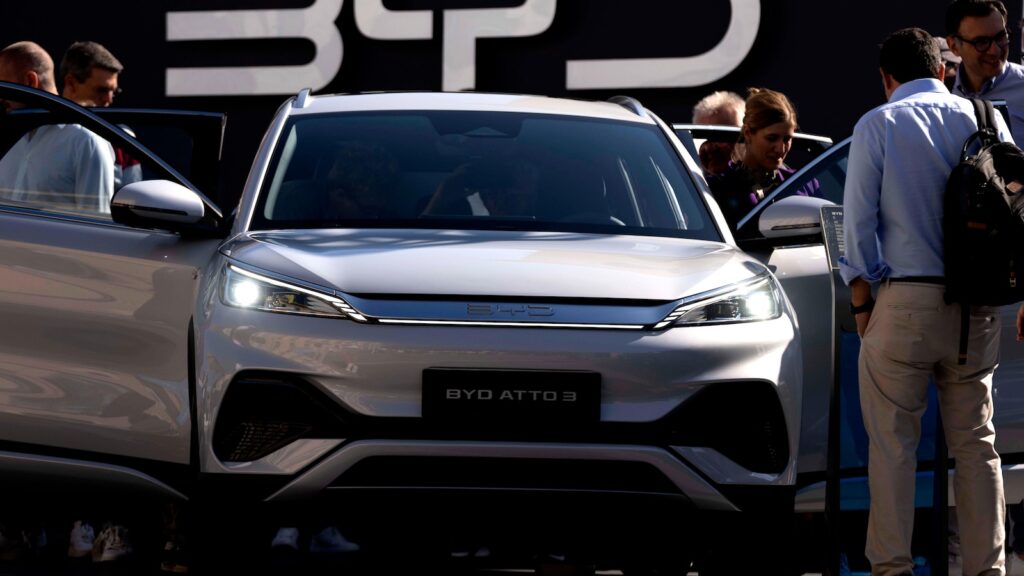Brussels — European Union countries voted on Friday to impose tariffs on imports of electric vehicles from China as talks continue between Brussels and China to find an amicable solution to the trade dispute by an end-October deadline. .
Electric vehicles are a key flashpoint in a broader trade dispute over the impact of Chinese government subsidies on European markets, forcing EU industrial prices to fall, and Beijing’s surge in green technology exports into the EU. It becomes.
The European Commission, which governs trade on behalf of 27 member states, welcomed majority approval of the plan to impose the tariffs, despite EU car powerhouses Germany and Hungary voting against it.
These obligations will come into effect on October 31, unless China has a solution to resolve the conflict.
European Commission spokesman Olof Gil said the solution proposed by the Chinese government is fully compatible with World Trade Organization rules, corrects China’s “harmful subsidies” and is “monitorable and enforceable.” He said that it must be something that has a certain level of quality.
The Chinese government opposes the mandate. “China firmly opposes the EU’s unfair, non-compliant, and unreasonable protectionist actions in this case,” a spokesperson for China’s Ministry of Commerce said in a comment posted online. We also firmly oppose the imposition of anti-subsidy tariffs.”
Still, this means the EU and Beijing have four weeks left to negotiate. Technical expert-level discussions have already taken place between EU Economic Affairs Commissioner Valdis Dombrovskis and Chinese Trade Minister Wang Wentao.
Technical teams from China and the EU are scheduled to resume negotiations on October 7.
If tariffs are applied to Chinese manufacturers, the tariffs will be 17% for BYD vehicles, 18.8% for Geely vehicles, and 35.3% for vehicles exported by China’s state-owned SAIC. Geely owns brands such as Polestar and Sweden’s Volvo, while SAIC owns Britain’s MG, one of Europe’s best-selling EV brands.
Other Chinese EV makers, including Western companies such as Volkswagen and BMW, will be subject to a 20.7% tariff. The fee for Tesla is 7.8%, which is “individually calculated.”
The retaliatory tariffs have faced opposition in Germany, Europe’s largest economy and home to major automakers.
Germany’s automobile industry association, VDA, said the German government had sent the “right signal” by voting no. The group’s chair, Hildegard Müller, said the decision “takes us further away from global cooperation.”
He acknowledged the need for negotiations with China, saying: “To avoid the risk of trade tensions, China must prevent escalation and ideally avoid tariffs.”
Hungarian Prime Minister Viktor Orbán warned that the EU risked starting an “economic cold war” with China and vowed to vote against the obligation. “This is the worst thing that can happen to Europe. …If things continue like this, the European economy will disappear,” he said on state radio.
China-made electric vehicles have soared from 3.9% of the EV market in 2020 to 25% by September 2023, according to the commission, partly due to unfairly lowering industry prices in the EU.
Brussels said Chinese companies achieved that with the help of subsidies throughout the production chain. They resorted to everything from cheap land for factories from local governments to below-market lithium and battery supplies from state-owned enterprises to tax breaks and easy loans from state-owned banks.
Rapid market share growth means that Chinese cars will ultimately not only threaten the EU’s ability to produce its own green technology to fight climate change, but also indirectly impact the lives of 2.5 million auto industry workers and It has raised concerns that it could threaten the jobs of a further 10.3 million people whose jobs depend on the industry. EV production.
___
Geir Moulson in Berlin contributed to this report.



